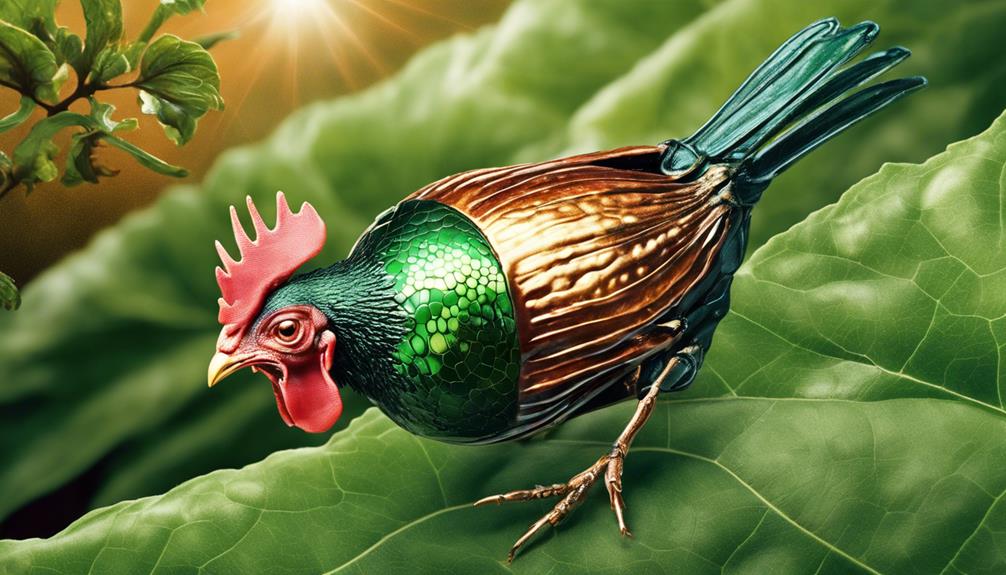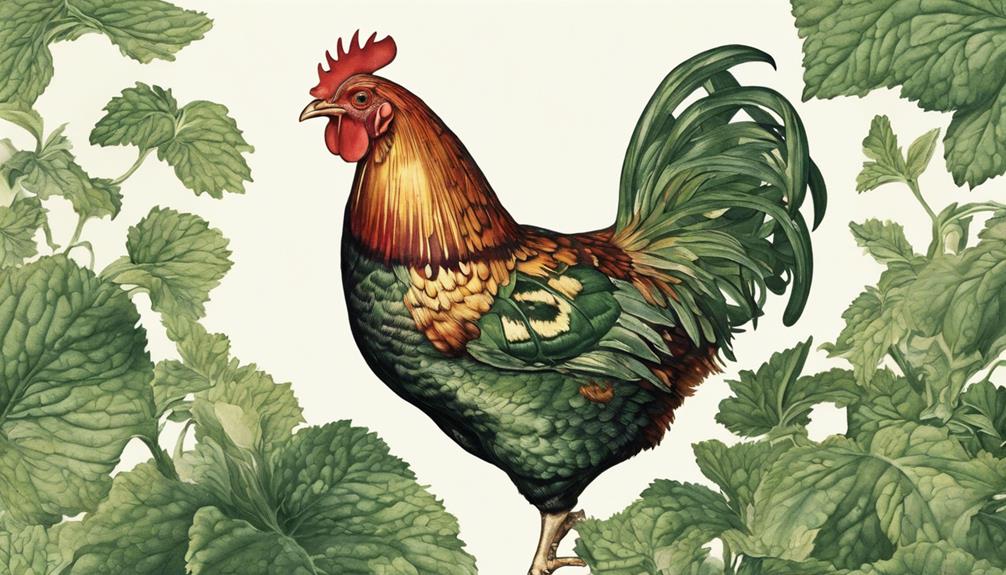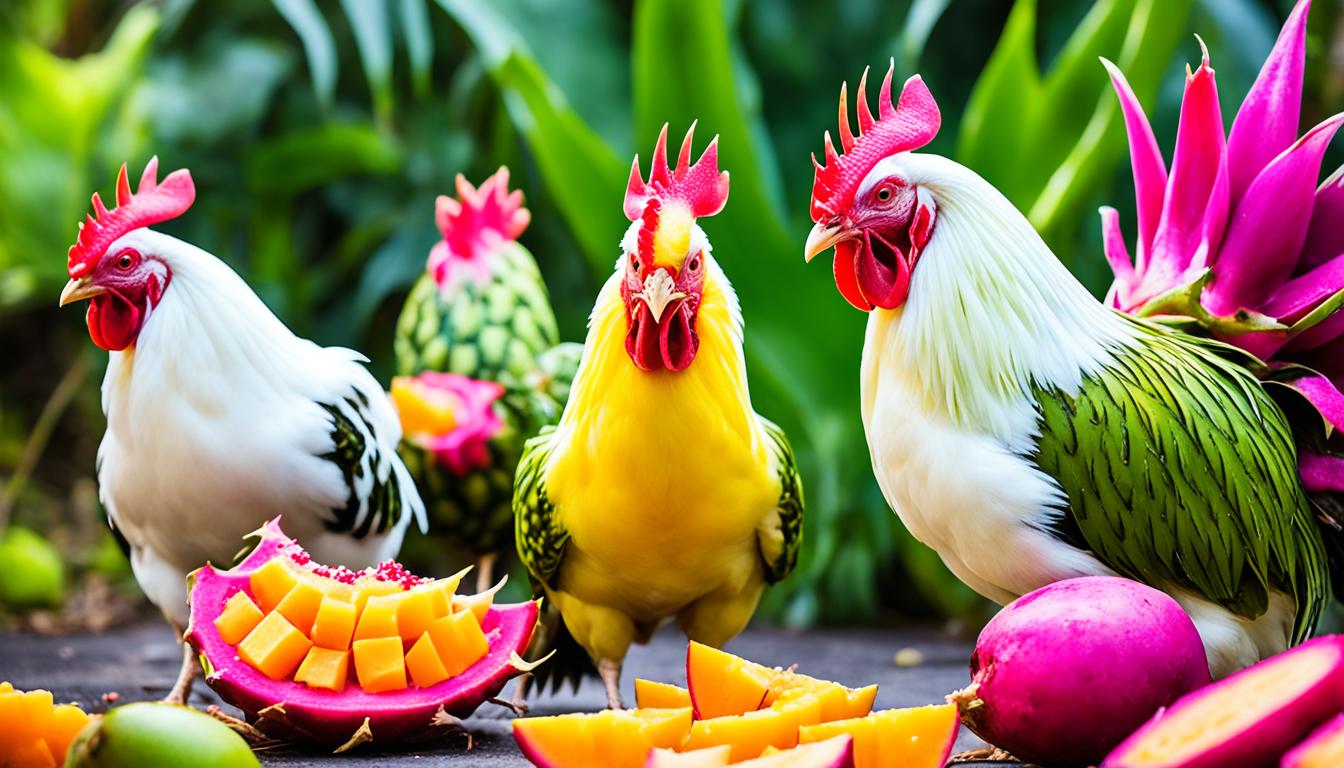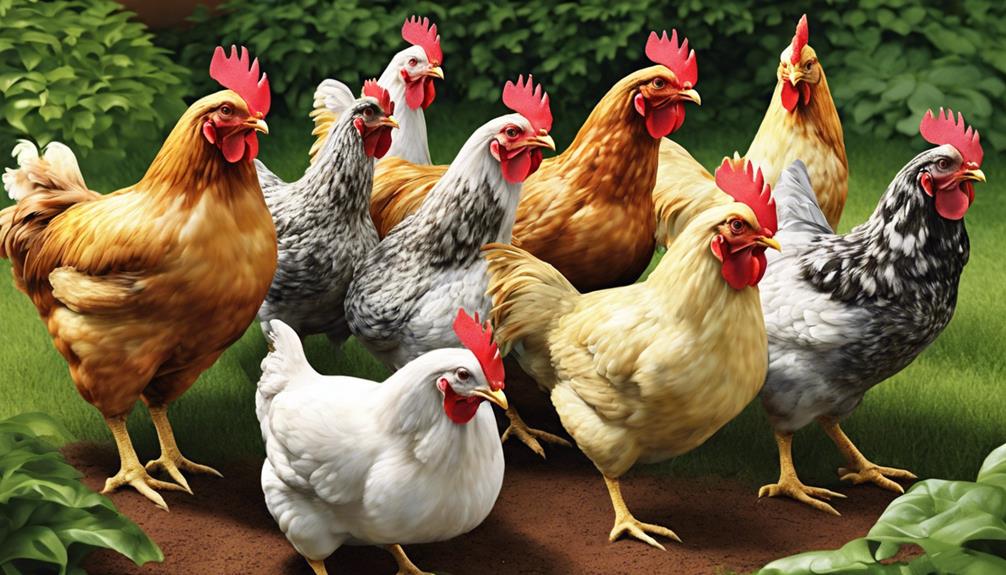We adore the way chickens view Japanese beetles as a tasty snack, improving their well-being and assisting gardeners in reducing beetle populations organically. Chickens excel at catching beetles, which can in turn enhance their foraging skills.
If you want to know more about how chickens eat Japanese beetles and their benefits for pest control and garden harmony, there is a lot to discover in the details provided.
Key Takeaways
- Chickens catch Japanese beetles in the air with their pecking instinct.
- Japanese beetles are a natural and nutritious snack for chickens.
- Hanging traps in the coop provide extra beetles for chicken consumption.
- Chickens' diet enriched by beetles enhances their health and vitality.
- Chickens help control Japanese beetle populations by consuming them.
Understanding Japanese Beetles and Chickens
How do chickens perceive Japanese beetles as a food source in their environment?
Chickens view Japanese beetles as a delectable and protein-rich treat.
To enhance their diet, hanging Japanese beetle traps in the chicken coop can be beneficial.
These traps act as a supplementary food source, providing the chickens with an opportunity to consume the trapped beetles.
The setup typically includes a PVC pipe, duct tape, and a plate for the beetles to land on, making it easier for the chickens to feed on them.
The beetles caught in the bag-a-bug pheromone traps offer additional nutrients to the chickens, contributing to their overall health.
By consuming Japanese beetles from these traps, the chickens not only enjoy a tasty snack but also gain essential nutrients that may not be present in their regular feed.
This natural feeding method can be a sustainable way to improve the chickens' diet and well-being.
Benefits of Chickens Eating Japanese Beetles

Chickens benefit significantly from consuming Japanese beetles as they provide a natural and nutrient-rich addition to their diet, promoting overall health and foraging skills. Chickens LOVE these beetles as a tasty snack, enjoying them as a natural food source.
The nutrients gained from eating Japanese beetles can contribute to the chickens' well-being, enhancing their overall health and vitality. Additionally, by consuming these beetles, chickens can develop a habit of catching them in the air, which can improve their foraging skills and natural hunting instincts.
This behavior not only benefits the chickens but also provides a practical solution for gardeners, as chickens can help control Japanese beetle populations and prevent further damage to plants like raspberries and roses. Overall, the supplemental diet from consuming Japanese beetles can help chickens thrive, leading to a healthier ecosystem within the chicken coop.
How Chickens Control Japanese Beetle Populations
By actively hunting and consuming Japanese Beetles, chickens play a crucial role in controlling the beetle population in their environment. Chickens are efficient predators of Japanese Beetles, with their natural instinct to peck at small moving objects making them adept at catching these pests. As chickens forage in gardens or yards, they actively seek out Japanese Beetles as part of their diet, helping to keep the beetle population in check. This behavior not only benefits the chickens by providing them with a tasty snack rich in additional nutrients but also aids in pest control for gardeners and farmers.
The presence of chickens in an area can lead to a decrease in Japanese Beetle numbers, as the chickens actively consume these pests. Additionally, utilizing Japanese Beetle traps to collect beetles for feeding chickens can further enhance their diet and contribute to reducing the beetle population. Overall, chickens offer a natural and effective method for managing Japanese Beetle populations, providing a sustainable solution for pest control in agricultural and garden settings.
Tips for Introducing Chickens to Your Garden

Introducing chickens to your garden should be done gradually to minimize the risk of plant damage. When raising chickens, it is crucial to provide them with a secure and spacious coop where they can roam freely within the garden. This helps prevent them from wandering into areas where they may cause harm to delicate plants. Supervising the chickens initially is essential to ensure they are not overeating or causing damage to the vegetation. Offering a balanced diet is also key in preventing chickens from solely relying on insects like Japanese beetles for nutrition. Additionally, using fencing or barriers can help protect specific areas of the garden from chicken foraging, preserving your plants and ensuring a harmonious coexistence between your feathered friends and your garden.
| Tips for Introducing Chickens to Your Garden |
|---|
| 1. Introduce chickens gradually to prevent plant damage |
| 2. Provide a secure and spacious coop for them to roam |
| 3. Supervise chickens initially to prevent overeating |
| 4. Offer a balanced diet to avoid reliance on insects |
Best Practices for Natural Pest Control

In gardens facing challenges from pests like Japanese beetles, effective strategies for natural pest control can play a crucial role in maintaining plant health and ecosystem balance. One of the best practices for controlling Japanese beetles involves using soapy water. A mixture of water and dish soap can be sprayed directly on the beetles, suffocating them and preventing further damage to plants. This method is particularly useful for smaller infestations or spot treatments.
Additionally, incorporating pheromone traps like the Bag-a-bug can help attract and trap Japanese beetles, reducing their population in the garden. By hanging these traps in strategic locations, such as near vulnerable plants, you can effectively control the beetle numbers.
Furthermore, integrating chickens into the pest control strategy can provide a natural and sustainable solution. The chickens not only enjoy feasting on the beetles but also contribute to the overall ecosystem balance by keeping pest populations in check. By combining these methods, gardeners can create a harmonious environment that promotes plant growth and biodiversity.
Frequently Asked Questions
Will Chickens Eat Japanese Beetles?
Yes, chickens will eat Japanese beetles. These insects are a preferred snack for chickens due to their high protein content. Chickens actively hunt and consume Japanese beetles when they're abundant in the environment. Their diet diversity benefits from this natural and nutritious food source.
Offering Japanese beetles to chickens can reduce the beetle population in their roaming area. Chickens habitually seek out and eat Japanese beetles, creating a mutually beneficial relationship.
How Do Chickens Eat Bugs?
We observe chickens eating bugs through active foraging, using their beaks to catch insects like Japanese beetles. This process involves quick movements and precise pecking to secure the prey. Chickens rely on their keen eyesight and agility to capture bugs efficiently.
Their natural instincts drive them to hunt insects as a supplementary food source, enhancing their overall diet with essential nutrients. This behavior showcases the adaptive and instinctual nature of chickens.
Will Birds Eat Japanese Beetles?
Absolutely, birds, including chickens, devour Japanese beetles eagerly. These pests are like a gourmet feast for our feathered friends.
Chickens, with their keen hunting skills, actively chase and consume these protein-rich insects. Eating Japanese beetles not only supplements their diet but also helps them develop improved hunting techniques.
Feeding these bugs to chickens can significantly benefit their health and overall well-being.
How Do Farmers Deal With Japanese Beetles?
Farmers address Japanese beetles using bag-a-bug pheromone traps. These traps lure and capture the beetles effectively. By placing them in chicken pens, we provide chickens with a supplemental food source as they consume the trapped beetles. This setup not only benefits the chickens but also helps protect plants like raspberries and roses from Japanese beetle damage.
The trap's design involves PVC pipes, duct tape, and a plate for the beetles to fall onto.
Can Chickens Also Safely Eat Japanese Beetles?
While chickens eating walnuts safely is up for debate due to potential health risks, they can safely snack on Japanese beetles. These pests are not only a good source of protein for chickens, but they also help control the beetle population in the garden.
Conclusion
In conclusion, chickens can be effective natural predators for controlling Japanese beetle populations in your garden. With their voracious appetites and keen hunting skills, chickens can help keep these destructive pests at bay.
So why not consider adding some feathered friends to your garden to help maintain a healthy balance and reduce the need for harmful pesticides? Give your chickens a chance to feast on Japanese beetles and watch them work their magic in your garden.










